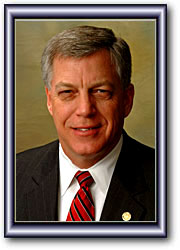Allie Rash is a senior double majoring in Mathematics and Religious Studies. She hails from Franklin, TN but calls North Carolina and Kansas home as well. She wrote this post for Dr. Finnegan’s class, REL 370: Hijab, Hip Hop, and Halal.
Gerald Allen is the State Senator from the 21st district of Alabama, representing Hale, Pickens, and Tuscaloosa counties. Before his election to the State Senate, Allen served four terms in the Alabama House of Representatives. Politically, according to his most recent ad in May, he is a ‘real conservative.’
Faith, freedom, and family are three central themes to Allen’s campaign. His website boasts of his commitment to his family and his church, and uses his support of a Marriage Equality Act as one of his defining moments of political leadership. In the past, Allen has moved to ban books written by homosexual authors and is currently running a campaign to ban Sharia law from Alabama courts. Although these moves may seem controversial to some, Allen has received abundant support, having won his election campaigns five times now.
In all of Allen’s political campaigning, there is a constant assumption of a particularly ‘Alabaman’ identity. Allen’s campaigning draws and encourages many imaginary religious, political, and social boundaries. He, in essence, creates an imagined homeland, a non-geographical, constructed identity that people hold to on certain real or imagined connections through values, and notions of identity.
Through our class discussions and readings, it seems that part of the purpose of an imagined homeland is to create a community that people can unite around, through assumed or constructed common understandings or ideals. This all works in order to elicit a feeling of connectivity and grounding within that certain identity. Whether that identity is more imagined than real seems to be less important than the connections and security that grow out of it.
For Allen, the imagined homeland he creates is a place where all true ‘Alabiamans’ are those who support a particular faith, family model, and view of the judicial system. Likewise, they are all under attack from the same ‘foreign’ predators, namely homosexuals and Muslims, in the examples cited above. The construction of this imaginary homeland allows Allen to accomplish a few things.
First, he creates a sense of community by raising particular issues which, presumably, will appeal to the masses – and thusly, furthering his definition of a “good” Alabamian by the assumption that one ought to be passionate about the issues he raises. For example, look at how Allen remarks on his campaign for book banning by saying things like, “I look at it as protecting the hearts and souls and minds of our children.” This appeals to the imagined community of Alabama families being threatened by ‘outsider’ influence that “doesn’t fit what [they] stand for.” According to Allen, who doesn’t want to protect the hearts and souls and minds of their children? And if you’re a good Alabamian or a even just a good American, Allen says these are the issues to care about, and the opinions to have on them.
Second, he is able to create a sense of authority for himself by establishing himself as the proprietor and embodiment of all these Alabaman identities he is promoting. He has been married for 41 years, raised three kids, and has been an ‘active member’ of his church since 1980. The image of the ‘Alabamian’ identity he constructs is the one that he can most comprehensively fulfill. His construction of what is specifically ‘Alabaman’ seems to be a reflection of what may be said about himself through all of his accomplishments and history.
As Edward Said suggests in Orientalism, a “relationship of power, of domination, of hegemony” is evident between the Occident and the Orient, and I think that idea is preserved here between the Alabamian or American and the foreign or ‘other’ (pg 5). These campaigns play upon a relationship of power, domination, and hegemony between constructed Alabamian identities and constructed ‘other,’ ‘foreign’ identities; with Gerald Allen as a figurehead for that Alabamian identity. These constructions create unity in order to preserve these imagined foundations of the judicial system, children’s minds, and marriage definitions, as well as give authority to Allen as one who might preserve those identities.
And so, from the Orientalism to Alabamian identity, it can be seen that power is inherently tied to the construction of imagined homelands. This makes you wonder what other imagined identities are present in the connections we have with our communities and governments. And it is interesting to notice that even theory that seems contained to ‘foreign’ or ‘other’ concepts is evident within daily life and politics in Tuscaloosa, Alabama — perhaps even further showing how imagined our ideas of ‘here’ and ‘there’ truly are.



Very well said, Ms. Rash. The super-conservative opinions and platforms of many politicians create a gaping chasm among the people of our world, nation and local communities.
Your blog post should give pause to some readers to reconsider the profound, yet subtle, impact on exclusivity in the “imagine homeland.”